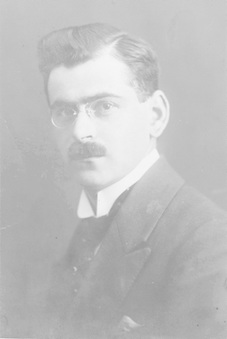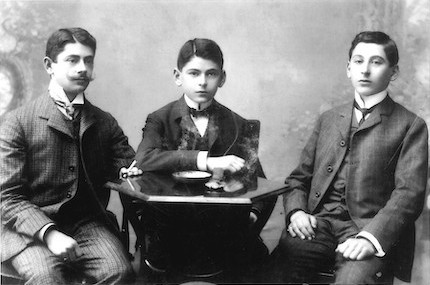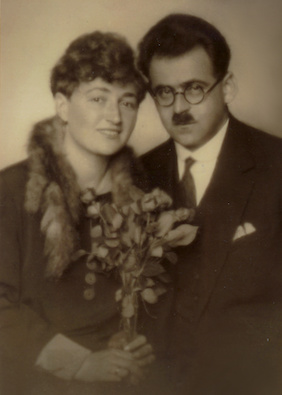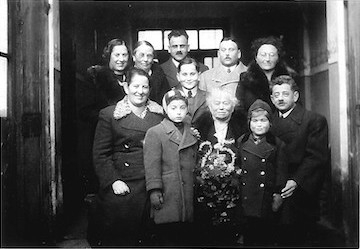
Our dad Professor Dr Hugo Jokl was born on 25th April 1891 in 207 Žižkova Street, Pacov. His father Filip (born on 18th November 1855, died on 6th January 1929 in Pacov) was the local rag-and-bone man, making the rounds of the neighbouring countryside. His mom was a homemaker. She had three boys. The oldest, Artur, became a shop assistant and later settled in Chýnov, while the middle son Richard opened a clothes store in Žižkova St, Pacov, on the site of today pharmacy. Artur and Richard married the Hermann sisters from Senožaty – Artur married Berta, and Richard, Olga.
Dad’s mom, my grandmother Alžběta Joklová née Pachnerová (born on 22nd November 1856 in Pacov, died in the Theresienstadt ghetto in 1943), wanted her youngest son to become a rabbi. Thus my dad enrolled at a high school in Prague while being only twelve years old. He graduated in 1912 from the Truhlářská High School. The Czech writer and journalist Karel Poláček was his classmate – their friendship lasted throughout Poláček’s life.

Afterwards dad studied at the rabbinical seminary in Vienna. Having graduated from the seminary he enrolled at the Faculty of Philosophy at the University of Vienna where he successfully defended his PhD thesis in 1922. Then he started teaching senior graders at the Komenský Czech school in Vienna. He taught Czech, German, Latin, geography, and history. He was a very popular teacher. I found that out myself in Bohdaneč after the war where I met one of his former pupils. He was a physician and remembered my dad very fondly.

Dad met our mom via the Czech Tourist Club in Vienna. They married in 1929. My brother was born in 1932 and I in 1933. Both our parents worked as Czech school teachers. My dad translated history schoolbooks which he then edited for the purposes of Czech elementary schooling in the 1930s. He was also involved in publishing the Slovanská Beseda (Slawisches Gespräch) social club annual almanac in Vienna. We were raised by a Czech governess called Miss Olga. Our childhood was happy until the Anschluss in March 1938. The very next day dad packed our snacks, mom collected our travel documents and we left for Bohemia (dad wanted to protect his mom who was already more than 80 years old). We found shelter in Pacov. Dad worked as a high-school teacher in the nearby Tábor, mom as an elementary-school teacher.
In spring 1939 we moved to Tábor. We were expelled from school in 1940. Dad continued to give lessons for one more year after that. He tried hard to keep in touch with his siblings and their families. Several letters sent by his mother from Theresienstadt and by his nephew Vladimír from Pacov, some of these written in Esperanto, survived from this time. We were issued our yellow badges in 1941. The discrimination started for real. Our Aryan mom kept teaching for some time but in February 1942 she was dismissed too. We had no income, had to make do with the least possible amount of food stamps. We were forcibly moved into a single 600-square-feet room with no sanitary facilities. Dad was summoned to the Hagibor labour camp in Prague in October 1944 and then transported into the Theresienstadt concentration camp in January 1945.

He came back in late May 1945 and resumed his teaching duties in September. He taught well, enjoyed teaching, and kept teaching even in retirement. He commuted to Soběslav, and then to Sezimovo Ústí too, to share his knowledge. He used to lecture off-hand, without a textbook, from memory. He was a wise and cultured man. Us kids and his pupils remember him with fondness and respect. He died at the age of 68 on 19th January 1960 and is buried in the family grave at the Pacov Jewish cemetery according to his wishes.
By Věra Chudáčková
Richard Jokl was born in 1889. His third son Vladimír was born in 1928. The preceding two sons died in infancy and are buried at the Jewish cemetery in Pacov. The whole family was transported into Theresienstadt in November 1942 and later into Auschwitz-Birkenau where they all died. Vladimír learned Esperanto from his uncle Hugo who lived in Tábor during the occupation. His surviving letters show him to have been a very intelligent and sensitive boy.

Artur Jokl was born in 1882. He was arrested during the occupation after being seen with a newspaper on his desk in a time when Jews were forbidden to read “Aryan press” and allowed to read the Jewish community official newsletter only. Because of his “transgression” he was imprisoned in the Mauthausen concentration camp where he died. His family was transported from Chýnov into Theresienstadt in 1942 and later to Auschwitz. However, both of his children – Zdena and Jiří – managed to catch the last ship to Palestine and their children Dana and Nora now live in America.
✡